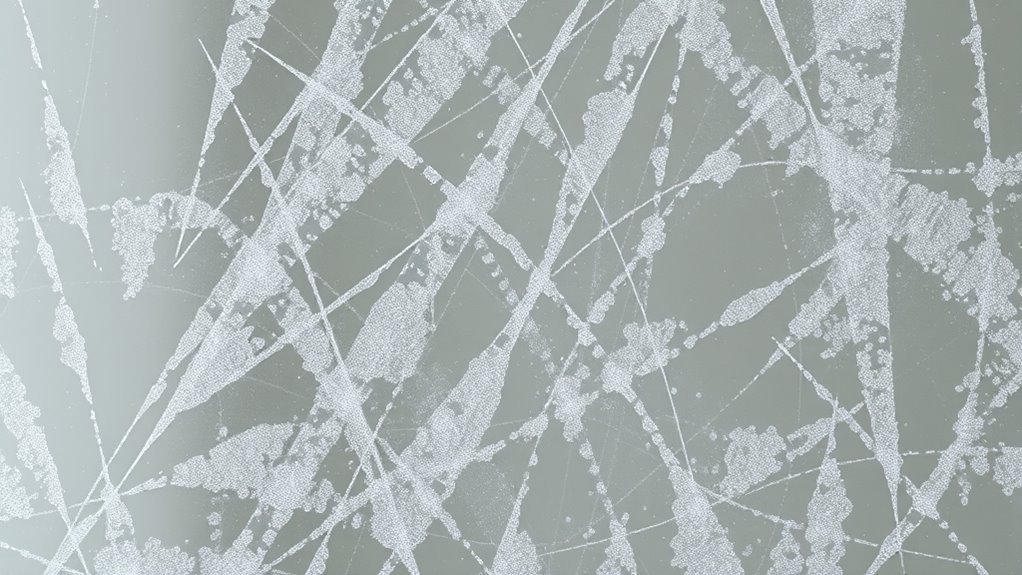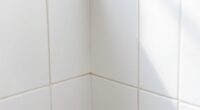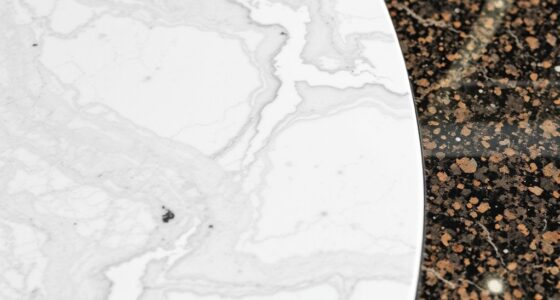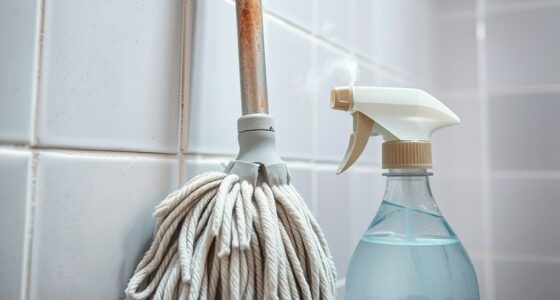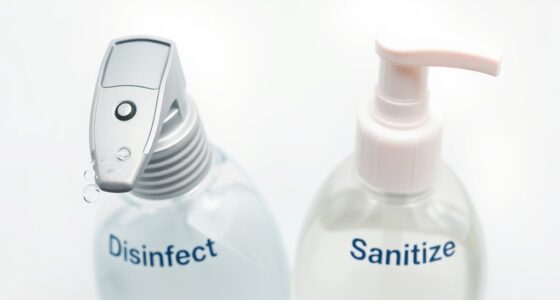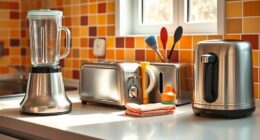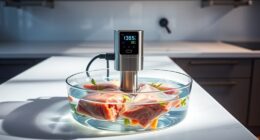To remove hard water stains from glass without scratching, try using a vinegar and water solution by spraying it generously and wiping clean. For tougher stains, make a baking soda paste and gently scrub. Lemon juice also works well to break down mineral deposits. If you prefer, commercial glass cleaners are designed to restore clarity safely. Keep your glass spotless by preventing future buildup—learn more about easy tips to keep your glass streak-free.
Key Takeaways
- Use a vinegar and water solution to gently dissolve mineral deposits without scratching the glass.
- Apply a baking soda paste for stubborn stains, then scrub lightly with a soft cloth or sponge.
- Utilize lemon juice to break down mineral buildup naturally, wiping clean with a soft cloth.
- Choose commercial glass cleaners formulated for hard water stains to ensure effective, scratch-free removal.
- Prevent future stains by regularly drying glass surfaces, installing water softeners, and applying protective sealants.
Using Vinegar and Water Solution
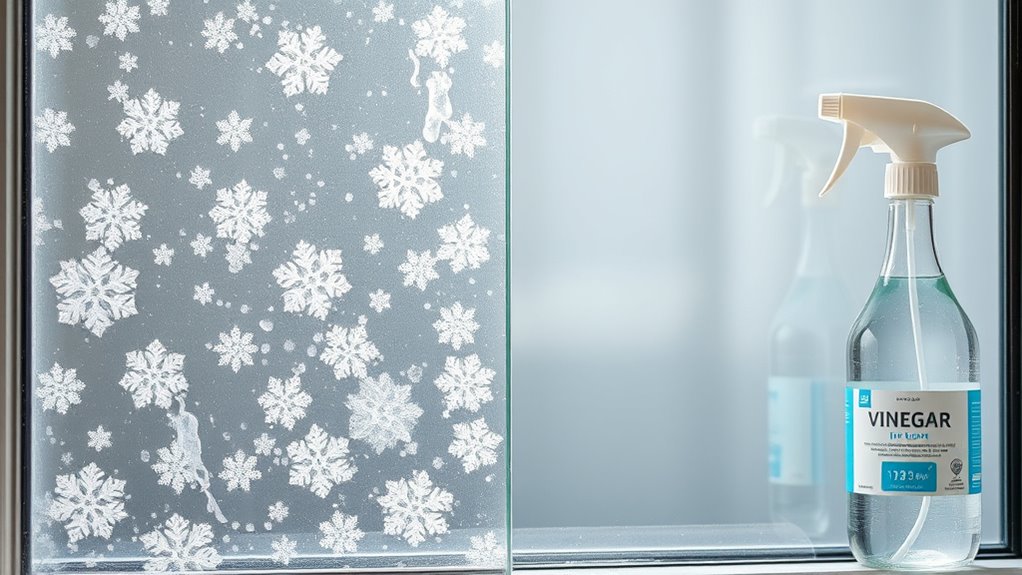
Vinegar and water form an effective, natural solution for removing hard water stains from glass. To create a vinegar solution, mix equal parts white vinegar and water in a spray bottle. This water mixture is gentle yet powerful enough to dissolve mineral deposits. Spray the solution generously on the stained glass surface, ensuring full coverage. Let it sit for a few minutes to break down the mineral buildup. Then, use a soft cloth or sponge to wipe away the stains. For stubborn spots, reapply the vinegar solution and allow it to sit longer. This method is safe, inexpensive, and eco-friendly, making it an excellent first step in tackling hard water stains without harsh chemicals. Additionally, understanding how automated cleaning solutions can assist in maintaining glass surfaces may further ease the cleaning process.
Baking Soda Paste for Stubborn Stains
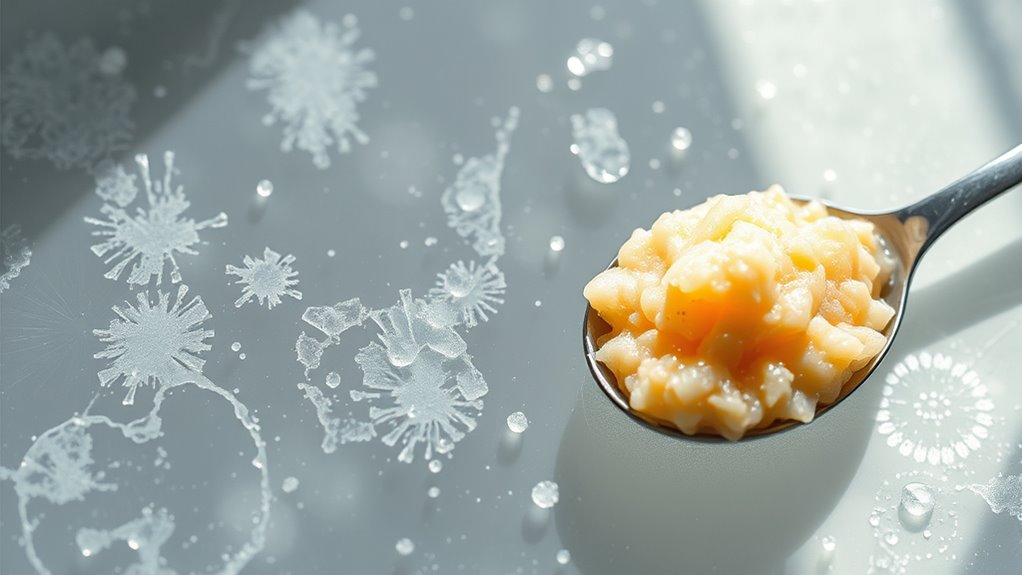
While the vinegar and water solution works well for light to moderate stains, stubborn hard water marks often demand a stronger approach. A baking soda paste acts as a natural abrasive, helping lift tough stains without scratching your glass. To prepare, mix baking soda with a small amount of water until it forms a thick paste. Apply the paste directly to the stained areas and let it sit for 10-15 minutes. Use a soft cloth or sponge to gently scrub in circular motions, enhancing stain removal techniques. Here’s a visual to clarify the process:
| Step | Action | Result |
|---|---|---|
| 1 | Apply baking soda paste | Loosen stubborn stains |
| 2 | Gently scrub in circles | Remove mineral deposits |
| 3 | Rinse with water | Restores clarity |
This method effectively uses natural abrasives to make stains vanish. Understanding mineral deposits can further improve your cleaning results.
Lemon Juice Natural Cleaner
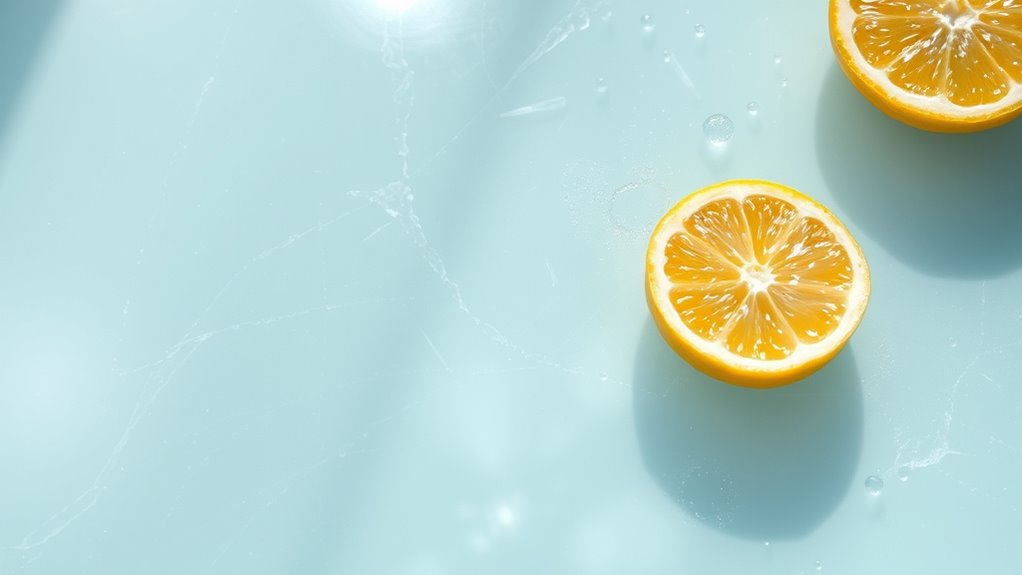
Lemon juice naturally cuts through hard water stains on glass thanks to its acidic properties. Its high acidity makes it effective for breaking down mineral deposits without scratching the surface. Lemon efficacy in natural cleaning comes from its citric acid, which dissolves calcium and lime buildup effortlessly. To use, squeeze fresh lemon juice directly onto the stained glass or mix it with water for a gentle spray. Let it sit for a few minutes, then wipe with a soft cloth or sponge. Rinse thoroughly with water and dry with a clean cloth to avoid streaks. This method is safe, eco-friendly, and cost-effective, making lemon juice a great natural cleaning solution for maintaining clear, spotless glass without harsh chemicals. Additionally, using natural cleaning agents like lemon juice can help reduce chemical exposure and environmental impact.
Commercial Glass Cleaning Products
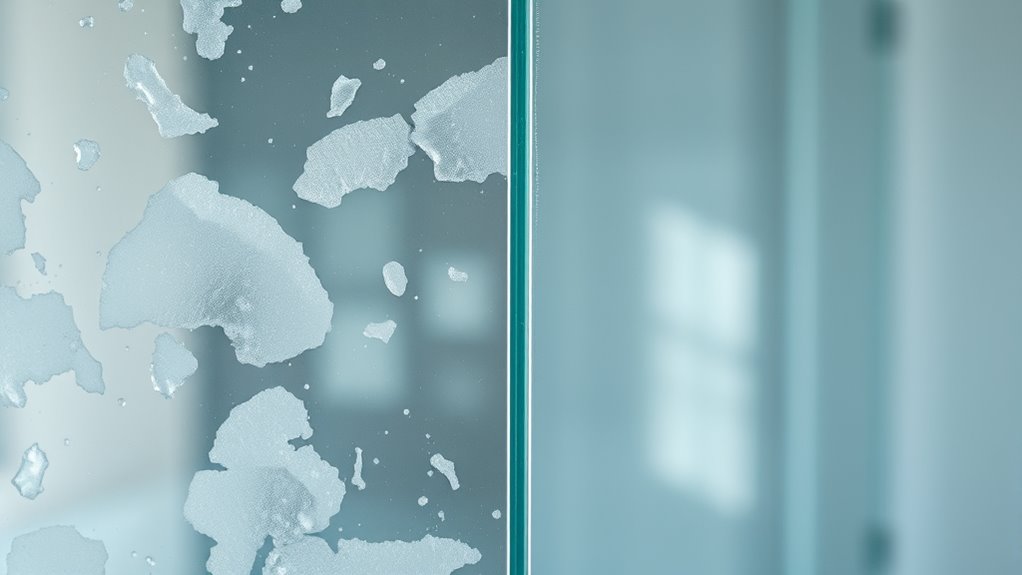
Commercial glass cleaning products offer a convenient and effective solution for removing hard water stains from glass surfaces. These products are designed to quickly break down mineral deposits, making glass polishing easier and more efficient. Many formulas also include features that help prevent future stains, such as anti-residue agents that reduce water spots. When used correctly, they can restore clarity without scratching or damaging the glass. Look for products labeled for hard water stain removal and stain prevention to guarantee you’re choosing the right one. Regular use of commercial cleaners can keep your glass looking pristine, saving you time and effort in the long run. Proper application and choosing the right product can also enhance cleaning effectiveness and ensure a streak-free, crystal-clear finish.
Preventing Future Hard Water Stains
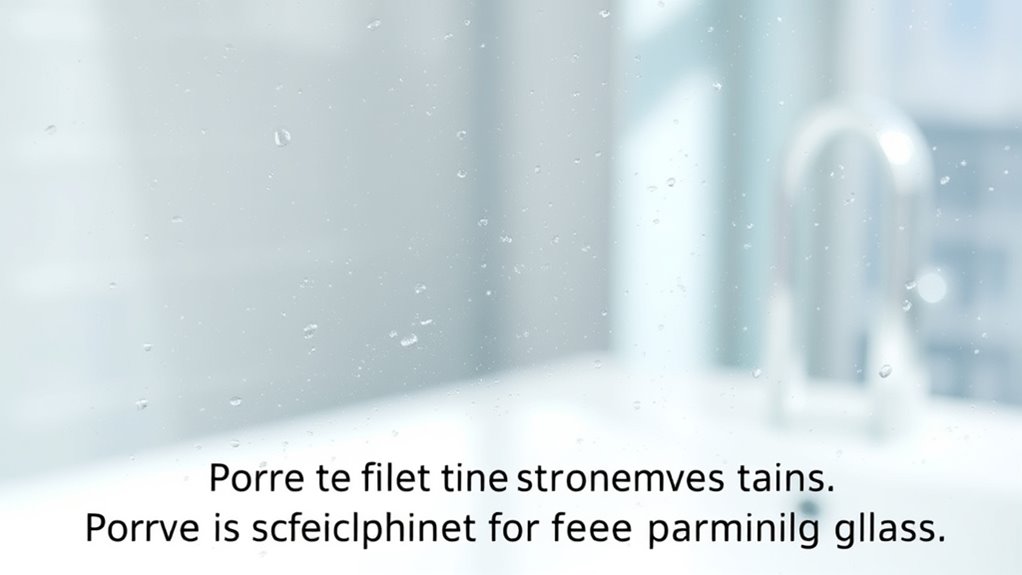
To prevent future hard water stains on glass, you should take proactive steps to minimize mineral buildup. Implement water softening systems to reduce calcium and magnesium levels in your water supply. Additionally, manage rain runoff by installing gutters and splash guards around windows and glass surfaces to prevent mineral-rich water from settling. Regularly wipe down glass surfaces with a squeegee or microfiber cloth to remove residual water before it dries. Consider applying a water-repellent sealant for added protection. Here’s a quick overview:
| Action | Benefit |
|---|---|
| Water softening | Less mineral deposit buildup |
| Manage rain runoff | Keeps water away from glass surfaces |
| Regular cleaning | Prevents stain formation |
| Sealant application | Creates a protective barrier |
| Quick drying | Stops minerals from drying onto glass |
A proper maintenance routine can further extend the lifespan of your glass surfaces and maintain their clarity.
Frequently Asked Questions
Can Hard Water Stains Damage Glass Over Time?
Yes, hard water stains can damage glass over time by affecting its durability. If left untreated, stain progression can lead to surface etching or tiny scratches, weakening the glass. You should clean stains promptly using gentle methods, like vinegar or commercial cleaners, to prevent long-term damage. Regular maintenance helps preserve your glass’s clarity and strength, ensuring it stays in good condition without risking deterioration from stubborn stains.
Are There Eco-Friendly Alternatives to Chemical Cleaners?
Think of eco-friendly options as the gentle rain nourishing your glass surface. Yes, there are natural solutions like vinegar, lemon juice, or baking soda that effectively tackle hard water stains without harming the environment. These eco-friendly options are safe, affordable, and work just as well as chemical cleaners. By choosing them, you protect your glass and the planet, making cleaning a sustainable and satisfying act.
How Long Does It Take for Stains to Disappear?
Stain removal time varies depending on stain severity and your cleaning techniques. Usually, you’ll see noticeable results within 15-30 minutes of applying a vinegar or lemon solution. For stubborn stains, it may take a few hours or multiple treatments. Be patient and consistent with your cleaning techniques, and avoid harsh scrubbing to prevent scratching. Regular maintenance guarantees your glass stays clear and spotless over time.
Can Hard Water Stains Be Removed From Tinted or Decorative Glass?
Yes, you can remove hard water stains from tinted or decorative glass, but you need to be careful. Use gentle, non-abrasive methods like vinegar or a mild commercial cleaner specifically for tinted or decorative glass during decorative glass cleaning. Avoid harsh scrubbing to prevent scratching or damaging the tint or design. Patience and gentle techniques are key for effective tinted glass removal without harming the decorative elements.
Is It Safe to Use Abrasive Tools on Glass Surfaces?
It’s a coincidence that many believe abrasive cleaners are safe for glass, but you should avoid using abrasive tools on your glass surfaces. They can cause glass scratching, damaging the finish and making stains harder to remove. Instead, opt for non-abrasive cleaners or gentle methods like vinegar or baking soda. Protect your glass by steering clear of harsh abrasives, ensuring it stays clear and scratch-free.
Conclusion
To keep your glass sparkling, try the vinegar and water solution regularly—like Sarah did after noticing stubborn spots on her shower door. She found that consistent cleaning prevented new stains from forming. Remember, natural remedies work well, but for heavy buildup, commercial products can be effective. By combining these methods and preventing hard water buildup, you can enjoy clear, streak-free glass without scratches. Your surfaces will stay pristine and beautiful with just a little regular care.
